Chairman
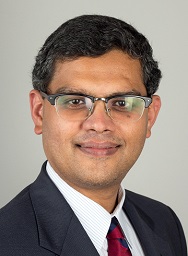
Ajith J. Thomas, MD
About Me
Prior to joining Cooper University Health Care as Chief of Neurosurgery, I spent 12 years at Beth Israel Deaconess Medical Center (BIDMC), building their program into one of the best cerebrovascular centers in the United States.
I have always strived to innovate and do research that is meaningful. I have had a natural curiosity about the working of things in general. In Pittsburgh, during my fellowship, I was closely involved in developing the field of endoscopic skull base surgery with Amin Kassam. Many of the seminal papers describing this technique, which was to have profound influence on neurosurgery, were written by Dr. Kassam and me.
Clinical innovation – This has taken place mainly in the field of cerebrovascular neurosurgery. My work has focused on multiple areas including brain aneurysm treatment, arteriovenous malformation, stroke and arteriovenous fistulas. A classification of carotid cavernous fistulas that I have developed is now known as the Thomas classification and is widely used all over the world.
In addition, I have spearheaded the wide adoption of flow diverter technology and improved its safety in patients, publishing more than 50 peer reviewed papers in the literature. More than 100,000 flow diverters have been placed globally, with our work playing a role in the expanded use of these devices. I edited a special edition of Neurosurgery (neurosurgery’s flagship journal) on this technology, published in January 2020. I have presented data on this technology at multiple meetings nationally and internationally and am recognized as a leading expert globally.
Technological advancement – I have been involved in various technology development projects. One such project involved developing a safe cranial drill with Harvard University which has been awarded a US patent.
Artificial intelligence – I have worked with L Pixel from Tokyo to develop automated MRI interpretation of brain aneurysms and with Qure.ai from Mumbai to assess hydrocephalus. Some of these data sets involve tens of thousands of patients. I have also been engaged with leadership of IBM – Watson Health to create a Neuroscience Center within IBM.
Basic science – I am an associate member of the Broad Institute, one of the world’s premier institutes focused on genomics. I have isolated early endothelial cells (periventricular endothelial cells) from the developing brain in the mouse. This was featured on the cover page of Brain Research and will have wide implications in our understanding of autism, schizophrenia, brain tumors, Alzheimer’s and their therapy.
Program Leadership

Ajith J. Thomas, MD
About Me
Prior to joining Cooper University Health Care as Chief of Neurosurgery, I spent 12 years at Beth Israel Deaconess Medical Center (BIDMC), building their program into one of the best cerebrovascular centers in the United States.
I have always strived to innovate and do research that is meaningful. I have had a natural curiosity about the working of things in general. In Pittsburgh, during my fellowship, I was closely involved in developing the field of endoscopic skull base surgery with Amin Kassam. Many of the seminal papers describing this technique, which was to have profound influence on neurosurgery, were written by Dr. Kassam and me.
Clinical innovation – This has taken place mainly in the field of cerebrovascular neurosurgery. My work has focused on multiple areas including brain aneurysm treatment, arteriovenous malformation, stroke and arteriovenous fistulas. A classification of carotid cavernous fistulas that I have developed is now known as the Thomas classification and is widely used all over the world.
In addition, I have spearheaded the wide adoption of flow diverter technology and improved its safety in patients, publishing more than 50 peer reviewed papers in the literature. More than 100,000 flow diverters have been placed globally, with our work playing a role in the expanded use of these devices. I edited a special edition of Neurosurgery (neurosurgery’s flagship journal) on this technology, published in January 2020. I have presented data on this technology at multiple meetings nationally and internationally and am recognized as a leading expert globally.
Technological advancement – I have been involved in various technology development projects. One such project involved developing a safe cranial drill with Harvard University which has been awarded a US patent.
Artificial intelligence – I have worked with L Pixel from Tokyo to develop automated MRI interpretation of brain aneurysms and with Qure.ai from Mumbai to assess hydrocephalus. Some of these data sets involve tens of thousands of patients. I have also been engaged with leadership of IBM – Watson Health to create a Neuroscience Center within IBM.
Basic science – I am an associate member of the Broad Institute, one of the world’s premier institutes focused on genomics. I have isolated early endothelial cells (periventricular endothelial cells) from the developing brain in the mouse. This was featured on the cover page of Brain Research and will have wide implications in our understanding of autism, schizophrenia, brain tumors, Alzheimer’s and their therapy.
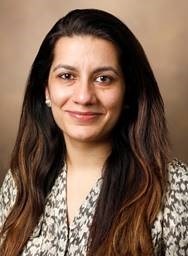
Saniya Siraj Godil, MD, MBBS, MSCI
About Me
Dr. Godil is a fellowship trained complex brain tumor and skull base neurosurgeon. She completed her neurosurgical residency at Vanderbilt University Medical Center and has also competed two skull base fellowships. She completed an enfolded minimally invasive and endoscopic skull base fellowship at Weill Cornell Medicine with Dr. Theodore Schwartz and a postgraduate complex open and endoscopic skull base fellowship at The Ohio State University with Dr. Daniel Prevedello.
Dr. Godil specializes in treatment of meningiomas, pituitary tumors, craniopharyngiomas, acoustic neuromas, schwannomas, gliomas, and all other benign and malignant brain tumors, and skull base pathologies. She has particular interest in utilizing minimally invasive approaches and endoscopic approaches for cranial surgery and brain tumors.
Her primary research interest includes medical education, quality of life and patient-centered outcomes research, prospective outcomes registries and health services research and development of quality improvement and outcomes tools and questionnaires. She has numerous publications and has presented at various national and international conferences.
Dr. Godil also has strong interest in medical student and resident education. She currently serves as the Associate Program Director of Neurosurgery Residency as well as Medical Student Clerkship Director and plays an active role in resident and medical student curriculum and teaching.
Sub-specialties
Neurosurgical Oncology and Skull Base
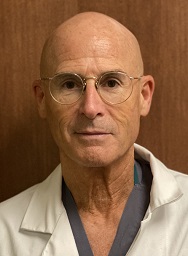
Alan R. Turtz, MD, FACS

Saniya Siraj Godil, MD, MBBS, MSCI
About Me
Dr. Godil is a fellowship trained complex brain tumor and skull base neurosurgeon. She completed her neurosurgical residency at Vanderbilt University Medical Center and has also competed two skull base fellowships. She completed an enfolded minimally invasive and endoscopic skull base fellowship at Weill Cornell Medicine with Dr. Theodore Schwartz and a postgraduate complex open and endoscopic skull base fellowship at The Ohio State University with Dr. Daniel Prevedello.
Dr. Godil specializes in treatment of meningiomas, pituitary tumors, craniopharyngiomas, acoustic neuromas, schwannomas, gliomas, and all other benign and malignant brain tumors, and skull base pathologies. She has particular interest in utilizing minimally invasive approaches and endoscopic approaches for cranial surgery and brain tumors.
Her primary research interest includes medical education, quality of life and patient-centered outcomes research, prospective outcomes registries and health services research and development of quality improvement and outcomes tools and questionnaires. She has numerous publications and has presented at various national and international conferences.
Dr. Godil also has strong interest in medical student and resident education. She currently serves as the Associate Program Director of Neurosurgery Residency as well as Medical Student Clerkship Director and plays an active role in resident and medical student curriculum and teaching.
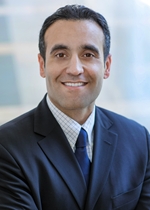
Navid Redjal, MD, FAANS
About Me
Dr. Redjal has been involved in significant translational brain cancer research and neuro-oncology clinical trials with research fellowships at the Dana-Farber Cancer Institute and Massachusetts General Hospital. He has conducted significant translational research in targeted local therapy for brain cancer and has been published in numerous medical journals devoted to neurosurgery and cancer research. He has been involved with Congress of Neurologic Surgeons glioma guidelines committee and has coauthored treatment guidelines for glioblastoma multiforme (GBM) and low grade gliomas. He recently co-authored guidelines for the treatment of brain metastases as part of a multidisciplinary panel of national/international brain tumor experts with contributions from members of the American Society of Clinical Oncology, the Society of Neuro-oncology, and the American Society of Radiation Oncology. He is also a Fellow of American Association of Neurological Surgeons (FAANS) and recently was selected to AANS/CNS Neurosurgery Joint Guidelines Review Committee (JGRC) for the Tumor Section, which is a standing subcommittee of experts of the Washington Committee of the American Association of Neurological Surgeons (AANS) and the Congress of Neurological Surgeons (CNS). He is part of a team of neuro-oncology national/international experts who evaluate clinical practice guidelines of potential relevance to neurosurgical practice.
Spine
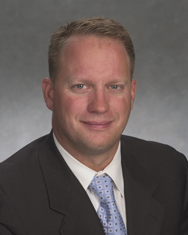
Steven S. Yocom, DO, FACOS
About Me
Dr. Yocom, Associate Professor of Clinical Neurosurgery, Cooper Medical School at Rowan University, is the Co-Director of the Cooper Neurological Institute Spine Program. He specializes in complex spinal surgery. He utilizes advanced spinal techniques and cutting-edge technology to operate on all types of spinal disorders. He also lectures and trains other spinal surgeons both locally and nationally. Dr. Yocom employs minimally invasive surgical techniques in his practice. He is the Director for the Philadelphia College of Osteopathic Medicine's Neurosurgery Residency training program.
Dr. Yocom has a particular interest in spinal trauma and spinal cord injury, cancer treatment of the spine and the treatment of degenerative disease of the spine. Dr. Yocom has access to the latest surgical and non-surgical treatment options available to help treat a wide range of back pain and spinal issues.
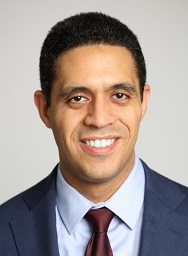
Islam Fayed, MD, MS
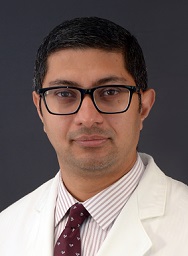
Karthik Madhavan, MD, FAANS
Neurotrauma and Neurocritical Care
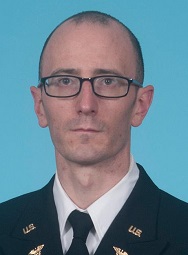
Corey M. Mossop, MD, FAANS
About Me
Lieutenant Colonel Corey Mossop is a native of Pennsauken, New Jersey and an is an active duty Army Neurosurgeon, Neurotraumatologist, and Neurointensivist who has been stationed at Cooper University Health Care since 2019 and is now transitioning to full-time employment at Cooper as he completes his military service. He matriculated into the Uniformed Services University of the Health Sciences Medical Doctorate Program after graduating summa cum laude from the University of Massachusetts at Amherst with a bachelor’s degree in Kinesiology in 2005. He commissioned into the Medical Corps upon receiving his Medical Doctorate at the Uniformed Services University of the Health Sciences in 2009. He completed his residency in Neurological Surgery at Walter Reed National Military Medical Center and a subsequent fellowship at R Adams Cowley Baltimore Shock Trauma Center in Craniofacial Trauma Surgery from 2009 to 2016. During this time, he was twice named Resident of the Year, won the Congress of Neurological Surgeon’s Resident Jeopardy competition twice, and had numerous peer-reviewed publications and presentations. His first post-residency assignment was at Tripler Army Medical Center in Honolulu, Hawaii where he served as the Neurological Surgery Service Chief. During this time, he was a key factor in the hospital’s transition and approval as an American College of Surgeons Level II Trauma Center.
He was then selected to join the Army Military Civilian Trauma Team Training Program at Cooper University Health Care in Camden, New Jersey as the first Neurological Surgeon assigned to the program to design and implement a program to facilitate increased neurosurgical trauma readiness amongst active duty Army Neurological Surgeons and Forward Resuscitative Surgical Team specialties. He has established several traumatic brain and spinal column injury research protocols of direct importance to active duty soldiers and is actively involved in the daily care of the most severely injured patients at Cooper University Health Care. He also maintains an active research interest in the facilitation of neurosurgical trauma readiness amongst the military community. His deployment experiences include a tour with the 499th Head and Neck Detachment in Baghdad, Iraq in support of Operation Inherent Resolve in 2018 and the 53rd Head and Neck Detachment in Baghdad, Iraq again in support of Operation Inherent Resolve in 2021. Finally, he is involved in the daily education of the resident team regarding Neurotrauma/Neurocritical Care at Cooper and is also a regular presenter at numerous medical student and nursing educational conferences.
Vascular and Neurointerventional
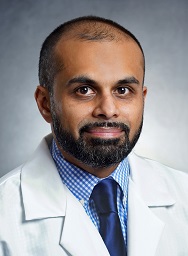
Hamza A. Shaikh, MD
About Me
Dr. Shaikh started the Endovascular Neurosurgery/Neurointerventional program at Cooper Hospital in 2014, and since then has built the program to become one of the best in the region. He came to Cooper after his Neuroradiology and Neurointerventional training at the Hospital of the University of Pennsylvania. Dr. Shaikh believes in treating patients and their families with respect, courtesy, and mutual understanding. He understands how scary things may become during a very vulnerable time in their lives and he feels that it’s his obligation to help families navigate the health care system for the benefit of their loved ones.Dr. Shaikh is actively involved in overseeing the Neurointerventional Surgery program, and the fellowship training program which was started in 2021.
He enjoys teaching faculty, students, residents, and fellows throughout their training to help them realize their true calling as physicians and caretakers of the health care system. Dr. Shaikh and the Neurosciences team is involved in many ground breaking and important research projects throughout the world. He also enjoys working with startup companies and artificial intelligence companies to develop tools that can help his patients improve their lives. His clinical interests include evaluation and treatment of cerebral aneurysms, arteriovenous malformations, strokes, spinal fractures. He also performs complex brain/head/neck/spine biopsies.
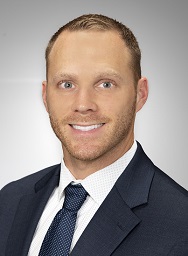
Daniel A. Tonetti, MD, MS

Ajith J. Thomas, MD
About Me
Prior to joining Cooper University Health Care as Chief of Neurosurgery, I spent 12 years at Beth Israel Deaconess Medical Center (BIDMC), building their program into one of the best cerebrovascular centers in the United States.
I have always strived to innovate and do research that is meaningful. I have had a natural curiosity about the working of things in general. In Pittsburgh, during my fellowship, I was closely involved in developing the field of endoscopic skull base surgery with Amin Kassam. Many of the seminal papers describing this technique, which was to have profound influence on neurosurgery, were written by Dr. Kassam and me.
Clinical innovation – This has taken place mainly in the field of cerebrovascular neurosurgery. My work has focused on multiple areas including brain aneurysm treatment, arteriovenous malformation, stroke and arteriovenous fistulas. A classification of carotid cavernous fistulas that I have developed is now known as the Thomas classification and is widely used all over the world.
In addition, I have spearheaded the wide adoption of flow diverter technology and improved its safety in patients, publishing more than 50 peer reviewed papers in the literature. More than 100,000 flow diverters have been placed globally, with our work playing a role in the expanded use of these devices. I edited a special edition of Neurosurgery (neurosurgery’s flagship journal) on this technology, published in January 2020. I have presented data on this technology at multiple meetings nationally and internationally and am recognized as a leading expert globally.
Technological advancement – I have been involved in various technology development projects. One such project involved developing a safe cranial drill with Harvard University which has been awarded a US patent.
Artificial intelligence – I have worked with L Pixel from Tokyo to develop automated MRI interpretation of brain aneurysms and with Qure.ai from Mumbai to assess hydrocephalus. Some of these data sets involve tens of thousands of patients. I have also been engaged with leadership of IBM – Watson Health to create a Neuroscience Center within IBM.
Basic science – I am an associate member of the Broad Institute, one of the world’s premier institutes focused on genomics. I have isolated early endothelial cells (periventricular endothelial cells) from the developing brain in the mouse. This was featured on the cover page of Brain Research and will have wide implications in our understanding of autism, schizophrenia, brain tumors, Alzheimer’s and their therapy.
Radiosurgery

Navid Redjal, MD, FAANS
About Me
Dr. Redjal has been involved in significant translational brain cancer research and neuro-oncology clinical trials with research fellowships at the Dana-Farber Cancer Institute and Massachusetts General Hospital. He has conducted significant translational research in targeted local therapy for brain cancer and has been published in numerous medical journals devoted to neurosurgery and cancer research. He has been involved with Congress of Neurologic Surgeons glioma guidelines committee and has coauthored treatment guidelines for glioblastoma multiforme (GBM) and low grade gliomas. He recently co-authored guidelines for the treatment of brain metastases as part of a multidisciplinary panel of national/international brain tumor experts with contributions from members of the American Society of Clinical Oncology, the Society of Neuro-oncology, and the American Society of Radiation Oncology. He is also a Fellow of American Association of Neurological Surgeons (FAANS) and recently was selected to AANS/CNS Neurosurgery Joint Guidelines Review Committee (JGRC) for the Tumor Section, which is a standing subcommittee of experts of the Washington Committee of the American Association of Neurological Surgeons (AANS) and the Congress of Neurological Surgeons (CNS). He is part of a team of neuro-oncology national/international experts who evaluate clinical practice guidelines of potential relevance to neurosurgical practice.

Alan R. Turtz, MD, FACS

Saniya Siraj Godil, MD, MBBS, MSCI
About Me
Dr. Godil is a fellowship trained complex brain tumor and skull base neurosurgeon. She completed her neurosurgical residency at Vanderbilt University Medical Center and has also competed two skull base fellowships. She completed an enfolded minimally invasive and endoscopic skull base fellowship at Weill Cornell Medicine with Dr. Theodore Schwartz and a postgraduate complex open and endoscopic skull base fellowship at The Ohio State University with Dr. Daniel Prevedello.
Dr. Godil specializes in treatment of meningiomas, pituitary tumors, craniopharyngiomas, acoustic neuromas, schwannomas, gliomas, and all other benign and malignant brain tumors, and skull base pathologies. She has particular interest in utilizing minimally invasive approaches and endoscopic approaches for cranial surgery and brain tumors.
Her primary research interest includes medical education, quality of life and patient-centered outcomes research, prospective outcomes registries and health services research and development of quality improvement and outcomes tools and questionnaires. She has numerous publications and has presented at various national and international conferences.
Dr. Godil also has strong interest in medical student and resident education. She currently serves as the Associate Program Director of Neurosurgery Residency as well as Medical Student Clerkship Director and plays an active role in resident and medical student curriculum and teaching.
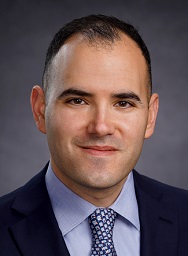
Justin M. Mann, MD
Stereotactic & Functional Neurosurgery

